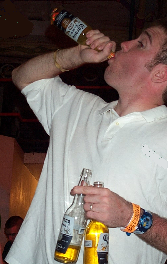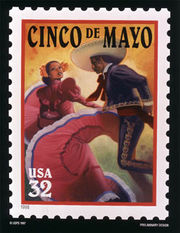 I'd like to correct a misconception people have about today's Mexican holiday. Most people think that the idea is to go down to the local cantina on May 5th and get stinking drunk -- and then to add the resulting May 6th hangover to the list of grievances that make us rather cross with Mexico. This is not what el Cinco de Mayo is all about.
I'd like to correct a misconception people have about today's Mexican holiday. Most people think that the idea is to go down to the local cantina on May 5th and get stinking drunk -- and then to add the resulting May 6th hangover to the list of grievances that make us rather cross with Mexico. This is not what el Cinco de Mayo is all about. according to Wikipedia,
El Cinco de Mayo ("The Fifth of May" in Spanish) is a national celebration in Mexico. It commemorates the victory of Mexican forces led by General Ignacio Zaragoza over the French expeditionary forces in the Battle of Puebla on May 5, 1862.
Historical background
In 1862, in response to Mexico's refusal to pay off its debt, Britain, Spain and France sent troops to Mexico; they arrived in January of 1862. The new democratically-elected government of President Benito Juárez made agreements with the British and the Spanish, who promptly recalled their armies, but the French stayed, thus beginning the period of the French intervention in Mexico. Emperor Napoleon III wanted to secure French dominance in the former Spanish colony, including installing one of his relatives, Archduke Maximillian of Austria, as ruler of Mexico.
Confident of a quick victory, 6,500 French soldiers marched on to Mexico City to seize the capital before the Mexicans could muster a viable defense. Along their march, the French already encountered stiff resistance before Zaragoza struck out to intercept the invaders.
The battle between the French and Mexican armies occurred on May 5 when Zaragoza's ill-equipped militia of 4,500 men encountered the better-armed French force. However, Zaragoza's small and nimble cavalry units were able to prevent French dragoons from taking the field and overwhelming the Mexican infantry. With the dragoons removed from the main attack, the Mexicans routed the remaining French soldiers with a combination of their tenacity, inhospitable terrain, and a stampede of cattle set off by local peasants. The invasion was stopped and crushed.
Zaragoza won the battle but lost the war. The French Emperor, upon learning of the failed invasion, immediately dispatched another force, this time numbering 30,000 soldiers. By 1864, they succeeded in defeating the Mexican army and occupying Mexico City. Archduke Maximillian became Emperor of Mexico.
Maximilian's rule was short-lived. Mexican rebels opposed to his rule resisted, seeking the aid of the United States. Once the American Civil War was over, the U.S. military began supplying Mexicans with weapons and ammunition, and by 1867, the rebels finally defeated the French and deposed their puppet Emperor. The Mexican people then reelected Juárez as president.
 Of course, there is nothing wrong with going down to the local cantina for pocas cervezas on el Cinco de Mayo [Note: be sure to squeeze the lime wedge into the beer and poke it down into the bottle. Most Mexican beer doesn't taste right without the lime and Corona has no taste at all.] Just don't blame your hangover on the poor Mexicans who are celebrating their hundred-and-forty-some year-old, temporary victory over the evil and insideous French.
Of course, there is nothing wrong with going down to the local cantina for pocas cervezas on el Cinco de Mayo [Note: be sure to squeeze the lime wedge into the beer and poke it down into the bottle. Most Mexican beer doesn't taste right without the lime and Corona has no taste at all.] Just don't blame your hangover on the poor Mexicans who are celebrating their hundred-and-forty-some year-old, temporary victory over the evil and insideous French.

No comments:
Post a Comment